

Winning Expert Power - Leadership Skills from MindTools.com. Lead From the Front, at Work © iStockphoto There are many different power bases that a leader can use and exploit.

These include problematic ones such as the power of position, the power to give rewards, the power to punish and the power to control information. While these types of power do have some strength, they put the person being lead in an unhealthy position of weakness, and can leave leaders using these power bases looking autocratic and out of touch. More than this, society has changed hugely over the last 50 years. French and Raven's Five Forms of Power - from MindTools.com. This site teaches you the skills you need for a happy and successful career; and this is just one of many tools and resources that you'll find here at Mind Tools.
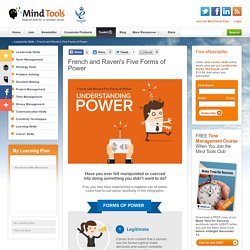
Click here for more, subscribe to our free newsletter, or become a member for just $1. Join the Mind Tools Club The Mind Tools Club gives you more help, ideas and training. And if you join before midnight on November 13, you also get a free copy of our Make Time for Success time management course. Find out more. French and Raven's Five Forms of Power - from MindTools.com. Understanding Where Power Comes From in the Workplace What's the source of your power?
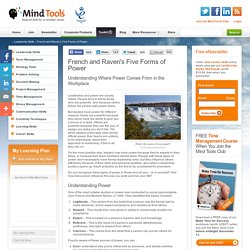
© iStockphoto/dwerner3 Leadership and power are closely linked. People tend to follow those who are powerful. And because others follow, the person with power leads. Mens en Samenleving: Sociaal cultureel. Expert kennis (expertise) is een van de bronnen waar mensen macht aan kunnen ontlenen.
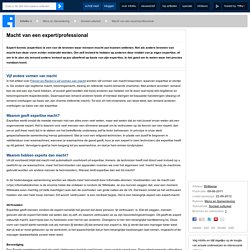
Net als andere bronnen van macht kan deze vorm echter misbruikt worden. Om zelf invloed te hebben op anderen door middel van je eigen expertise, of om in te zien als iemand anders invloed op jou uitoefend op basis van zijn expertise, is het goed om te weten waar het precies vandaan komt. Vijf andere vormen van macht In het artikel over French en Raven’s vijf vormen van macht worden vijf vormen van macht besproken, waarvan expertise er eentje is.
De andere zijn legitieme macht, beloningsmacht, dwang en referente macht (iemands charisma). Waarom geeft expertise macht? Expertise werkt omdat de meeste mensen niet van alles even veel weten, maar wel weten dat ze niet zoveel ervan weten als een zogenoemde expert. Waarom hebben experts dan macht? Uit dit voorbeeld blijkt dat macht niet automatisch voortvloeit uit expertise. In de hedendaagse samenleving worden we steeds meer beinvloedt door informatie-stromen. Educational Management Course by Leslie Laurie Embleton Hammond on Prezi. Machtsbronnen (bronnen van macht) Vijf grondslagen van macht (French en Raven) - Leiderschap - ScienceProgress.nl. Geschreven door: Vincent van Vliet Sociaal psychologen John French en Bertam Raven hebben in 1959 een opmerkelijke studie uitgevoerd over macht.
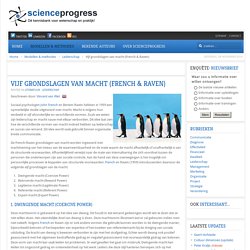
Macht is volgens hun verdeeld in vijf afzonderlijke en verschillende vormen. Zoals we weten zijn leiderschap en macht nauw met elkaar verbonden. Dit idee laat zien hoe de verschillende vormen van macht invloed hebben op leiderschap en succes van iemand. Dit idee wordt vaak gebruikt binnen organisatie brede communicatie. French and Raven’s Power Bases. Social power is the ability to influence other people.
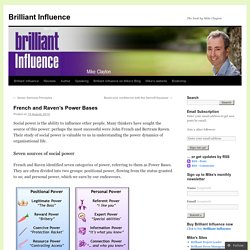
Many thinkers have sought the source of this power: perhaps the most successful were John French and Bertram Raven. Their study of social power is valuable to us in understanding the power dynamics of organisational life. Seven sources of social power French and Raven identified seven categories of power, referring to them as Power Bases. They are often divided into two groups: positional power, flowing from the status granted to us; and personal power, which we earn by our endeavours. The Treehorn Express. Until Naplan is ‘dead, buried and cremated’… Since he was an obedient little boy, Treehorn, the hero of Florence Patty Heidi’s The Shrinking of Treehorn , wouldn’t bother to take much notice of Naplan, National Standards, National Testing or NCLB or any other blanket testing name.
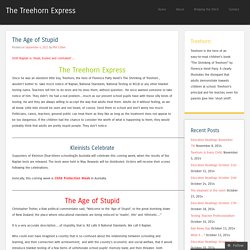
Teachers tell him to do tests and he does them, without question. He once wanted someone to take notice of him. They didn’t. He had a real problem…much as our present school pupils have with these silly kinds of testing. Kleinists Celebrate Supporters of Kleinism [fear-driven schooling]in Australia will celebrate this coming week, when the results of the Naplan tests are released. Ironically, this coming week is Child Protection Week in Australia. Christopher Trotter, a Kiwi political commentator said, “Welcome to the ‘Age of Stupid’; to the great dumbing down of New Zealand; the place where educational standards are being reduced to ‘readin’, ritin’ and ‘rithmetic…” The craziness is not an NZ phenomenon. Making Change Happen – Power and Influence. If you look at our article on “How Change Happens”, we outline our experience of change in organisations and the need to link it to business strategy.
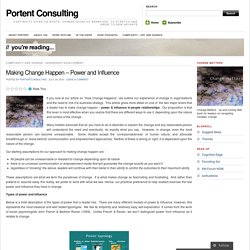
This article gives more detail on one of the two major levers that a leader has to make change happen – power & influence in people relationships. Our proposition is that this lever is most effective when you realize that there are different ways to use it, depending upon the nature and context of the change. Many models advocate that all you have to do is describe or explain the change and any reasonable person will understand the need and eventually, do exactly what you say. However, in change, even the most reasonable person can become unreasonable. Some models accept the ‘unreasonableness’ of human nature, and advocate breakthrough or ‘leave behind’ communication and empowerment approaches.
Our starting assumptions for our approach to making change happen are: Power and Leadership by Noni Griffiths on Prezi. Group 4 by Joona Kapanen on Prezi. Appreciating Power by Kenneth Sciberras on Prezi.